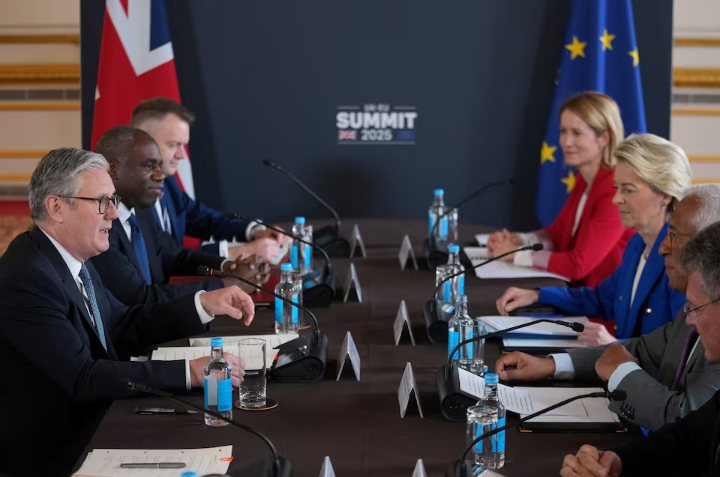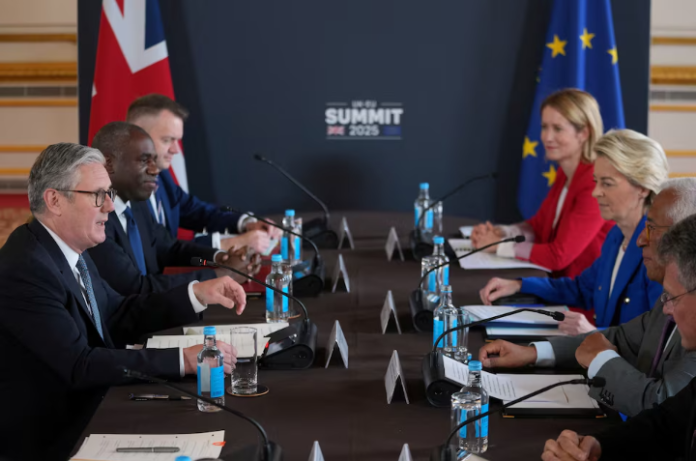In a historic move nearly a decade after the Brexit vote, Britain and the European Union have agreed to reset their defence and trade relations—marking the most significant collaboration since the UK left the bloc. This new agreement, signed in London, aims to strengthen cooperation in key areas like military procurement, food exports, border controls, and youth mobility.
Prime Minister Keir Starmer and European Commission President Ursula von der Leyen spearheaded the summit, signaling a new chapter of cooperation between Britain and its biggest trading partner. The deal comes amid a rapidly changing global landscape, particularly due to former U.S. President Donald Trump’s reshaping of international trade and security policies. These developments have pushed both the UK and the EU toward a more united front.
Defence and Economic Gains
At the core of the agreement is a wide-ranging defence and security pact. British defence giants like BAE Systems, Rolls-Royce, and Babcock are now eligible to join a massive €150 billion ($167 billion) European rearmament programme. This opens new business opportunities and strengthens Europe’s collective defence framework.
On the economic side, the deal introduces practical benefits for British businesses and consumers. Red tape surrounding food and agricultural exports to the EU will be drastically reduced. This means UK food producers—especially small and medium enterprises—can export with fewer hurdles, potentially lowering food prices and boosting economic growth.
The UK government estimates this reset could add nearly £9 billion ($12.1 billion) to the economy by 2040. While immediate economic gains may be modest, the move is expected to uplift investor confidence and encourage long-term investments.
A Controversial Fishing Agreement
One of the most debated aspects of the deal is a 12-year fishing arrangement. Both British and EU vessels will have mutual access to each other’s waters. In return, Britain secured reduced border checks and paperwork for its exporters—key concerns for rural businesses. Critics, however, argue this gives away too much leverage in future negotiations.
People-Centric Changes
Starmer’s strategy focuses on delivering real-life benefits to Britons. One headline initiative is the reintroduction of fast-track e-gates at EU airports for UK travelers. The agreement also outlines plans for a limited youth mobility scheme and discussions to rejoin the Erasmus+ student exchange program, which could enhance educational and cultural ties.
A Delicate Balancing Act
This move is not without political risk. Nigel Farage and the Conservative opposition have already criticized the agreement, framing it as a betrayal of Brexit. However, recent polls show a growing number of Britons now regret the 2016 decision to leave the EU—though they are not necessarily in favor of rejoining.

Instead of seeking full EU membership or re-entering the single market, Starmer aims for “common sense” collaboration in key areas. For instance, in exchange for relaxed food export rules, Britain agreed to adhere to EU standards—breaking a long-standing political taboo. Yet experts say this is a smart compromise, especially if it helps farmers and small businesses.
Looking Ahead
Despite the deal, the UK economy remains structurally different from its pre-Brexit state. London’s financial sector, for example, has seen job losses and reduced tax contributions. But this latest agreement could signal the start of a more pragmatic, cooperative approach that benefits both sides.
As Starmer put it: “It’s time to move on from the old battles and work together for the good of the British people.”



